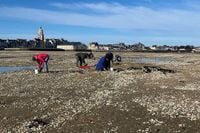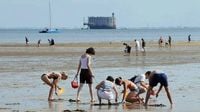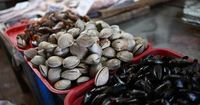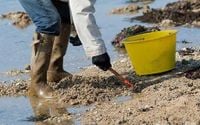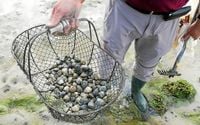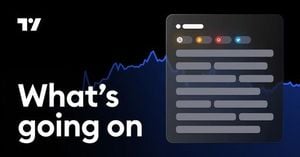In a significant health precaution, the prefectures of Loire-Atlantique and Vendée have issued decrees prohibiting the fishing, collection, and sale of all shellfish along their coasts due to the alarming proliferation of a toxic alga, Pseudo-nitzschia australis. This decision comes just ahead of a weekend marked by large tides, a time when many enthusiasts typically engage in shore fishing.
The alarming rise of Pseudo-nitzschia australis was confirmed by recent seawater analyses conducted on March 25 and March 27, 2025, which revealed concentrations of the alga far exceeding safety thresholds. As a result, both prefectures have acted swiftly to safeguard public health by banning all activities related to shellfish destined for human consumption.
According to the prefecture's statement, the decree prohibits not only fishing and collection but also the transport, storage, and marketing of shellfish from the coastal areas of Loire-Atlantique. This ban encompasses both professional and recreational activities. The geographical scope of the prohibition extends from the northern coast near Asserac to Les Moutiers-en-Retz in Loire-Atlantique. In Vendée, the ban affects the entire Baie de Bourgneuf, the west coast of Île de Noirmoutier, and the coast of Île d'Yeu.
The prefecture has underscored the potential health risks associated with consuming shellfish contaminated by the toxin produced by Pseudo-nitzschia australis, which is known to cause severe neurological disorders. Symptoms can manifest as gastrointestinal issues followed by neurological problems, which may include disorientation, confusion, memory loss, convulsions, and even coma, potentially leading to death. These symptoms can appear anywhere from 15 minutes to 48 hours after ingesting contaminated shellfish.
Worse yet, the toxins produced by this alga are not destroyed by cooking, making it imperative for consumers to avoid shellfish from the affected areas entirely. The prefectures have advised consumers to destroy any shellfish they may have collected from the banned zones and to refrain from consuming shellfish whose origins are uncertain.
This contamination incident is particularly unfortunate as it coincides with a weekend of large tides, which are typically a peak time for amateur fishermen. The large tides expected on March 29 and 30, 2025, are particularly favorable for shore fishing, and many local enthusiasts look forward to this seasonal activity.
Authorities have noted that while contamination from microalgae is a natural phenomenon that can be seasonal, it has become increasingly associated with the rapid warming of ocean waters, a consequence of climate change. This is not the first time such measures have been necessary; in December 2023, several prohibition orders were issued along the French coast due to mass poisoning cases linked to shellfish contaminated with norovirus.
The prefecture of Charente-Maritime has also reminded the public of essential safety principles when engaging in shore fishing, especially during periods of large tides. As the situation develops, local officials continue to monitor water quality closely to ensure public safety.
As the weekend approaches, the public is urged to stay informed and heed the warnings from local authorities. The ongoing situation highlights the delicate balance between enjoying coastal activities and ensuring health safety in the face of environmental changes.
